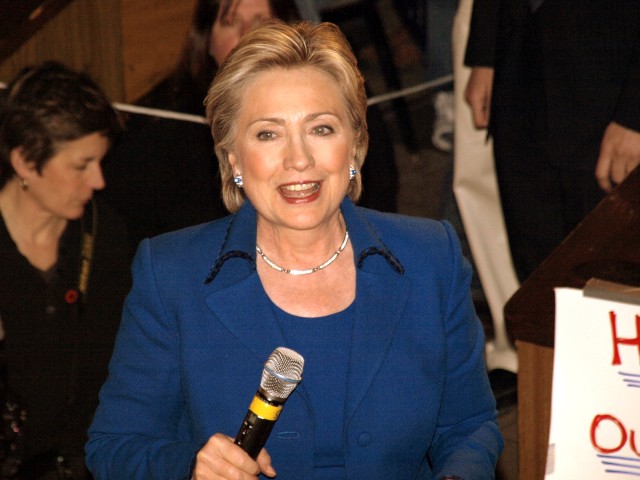The debates have exposed differences in Clinton and Sanders’ positions on key issues. Sanders wants free pubic college, a new Glass–Steagall Act to regulate the banks, and single-payer healthcare, whereas Clinton wants a work-study program for debt-free college, and prefers strengthening Dodd-Frank’s financial regulations and the Affordable Care Act. By invoking her experience in “getting things done” versus Sanders’s “idealism,” Clinton conveys that pragmatism is inherent in her platform; that she stands to the right of Sanders because her positions have a better chance of being enacted. But in fact, Clinton disagrees with Sanders’s major positions on principle first, and thus stands to the right of most Americans. Worse, her principles are unsound, inane, or petty, and often taken straight from the far right.
Clinton has at least two reasons to oppose single-payer healthcare. One is that since she claims single-payer would constitute a slight tax increase on the middle class, she will not allow herself to consider it. Here, Clinton is the perfect anti-pragmatist, making up her own arbitrary rules to obstruct sensible policy, and retain the U.S.’s position as the most inefficient health care state in the world (How pleased is Grover Norquist!). Never mind that the “tax increase” would be a semantic one for most Americans, since most will save thousands on health insurance and medical bills while paying a few hundred dollars more in taxes. Second, Clinton also opposes single-payer because of the fiction that it could not pass unless Obamacare were first unilaterally abolished. This notion is a demonstrable fabrication, contradicted by a basic understanding of legislative procedure. It is embarrassing that Chelsea Clinton first peddled it; shameful that Hillary would advance the lie.
Sanders plans to make public college free, as it already is in most of Europe, and much of Latin America. And since Sanders’ plan would not subsidize private colleges, it is conservative compared to those countries where all good colleges are free and public and where private college is a vulgarity. But Clinton opposes free tuition, not primarily because of pragmatism, but because she believes that free public college is intrinsically unjust; because she does not believe that taxpayers should send “Donald Trump’s kids” to school for free. It follows that Clinton should work to abolish in-state tuition, since why should we pay to subsidize Trump’s kids? Hell, why don’t we abolish public K-12 education, to spite a tiny fraction of super-rich children? This faux-populist and cynical notion that the many should not subsidize tuition for the wealthy has been a favored tactic of right-wing economists from Milton Friedman to Gary Becker, used to oppose nearly every new social program.
Clinton is at her obfuscatory worst when discussing financial regulation. In the fourth Democratic debate, she demurred Sanders’ plan for a 21st century Glass-Steagall Act not for any specific reason, but because Sanders’ advocacy of Glass-Steagall seems to her an implicit denunciation of President Obama. When asked to respond to Sanders’s championing Glass-Steagall and to clarify the differences between herself and Sanders, Clinton remarked, “Well, there’s no daylight on the basic premise that there should be no bank too big to fail and no individual too powerful to jail. We agree on that. But where we disagree is the comments that Senator Sanders has made […]. Senator Sanders called [Obama] weak, disappointing. So I’m going to defend Dodd- Frank and I’m going to defend President Obama for taking on Wall Street, taking on the financial industry and getting results.” Elsewhere, Clinton has remarked that Glass-Steagall “is nowhere near enough,” and that her financial regulation plan is far more progressive than Sanders’. She fails to explain why her own wild-eyed idealism should succeed on this particular issue, and why Sanders’s should fail on others. The charitable view is that Clinton’s ideas on financial regulation are extremely eccentric: Dodd-Frank surprisingly goes far enough, but Glass-Steagall somehow doesn’t; and Sanders, who, to her, is a dreamer on most issues, is unimaginatively conservative on this one that he cares most deeply about. A more plausible view is that Clinton is using crude tricks, scaring off sound policy in the name of Obama and using pathetic hand-waving to avoid promising to support crash-preventing legislation such as Glass-Steagall.
Clinton’s arguments on healthcare, higher education and regulation, if taken seriously, reduce to self-satire. She can only be defended on the dubious grounds that she is lying about them; that she is not crude enough to oppose needed legislation because of the Norquistian and Friedmanite reasons that she gives, but simply because she knows that Sanders’ legislation is unlikely to pass, and that it is somehow unpalatable to directly state this. No doubt her apologists believe this, which is why they support her despite the right-wing logic that informs her rhetoric. Their tortuous belief is that Clinton, who has never been progressive in her 25 years on the national stage, now really is a progressive thanks to pressure from Sanders; but that she is preferable to Sanders not because of the reactionary reasons she gives to distinguish her from him, but because deep down, she knows that her half-measures are more likely to pass than Sanders’s progressive platform—all despite the fact that Obama got almost nothing passed since 2011, no matter how mildly progressive or even moderate or center-right his proposals were. Maybe Clinton is a secret pragmatist like Obama is a secret Muslim.

